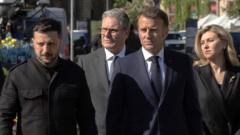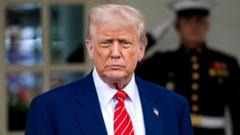Tensions rise as the Trump administration balances diplomacy and military readiness in the Middle East.
U.S.-Iran Nuclear Negotiations: Israel on High Alert

U.S.-Iran Nuclear Negotiations: Israel on High Alert
As the U.S. continues nuclear discussions with Iran, Israel remains vigilant about potential outcomes.
As the United States prepares to engage in renewed diplomatic discussions with Iran regarding its nuclear ambitions, all eyes are now fixed on Israel, which has historically depended on a strong stance from President Trump against the perceived threats from Tehran. Trump, during his first term, took decisive actions, including the assassination of a senior Iranian military figure and stringent economic sanctions that crippled Iran, while also distancing the U.S. from the nuclear agreement established under the previous administration.
However, the current approach indicates a shift towards diplomacy, despite Trump’s firm declarations about military options remaining on the table. "If we have to do something very harsh, we’ll do it,” Trump stated recently, underscoring the ongoing possibility of conflict. Notably, sources suggest that Trump has requested Israel to refrain from conducting military strikes on Iranian nuclear sites while negotiations are ongoing.
The dynamics in these talks have been further complicated by the mixed signals from Trump’s chief negotiator, Steve Witkoff. He oscillated between suggesting that Iran could be permitted to maintain a limited nuclear program to asserting the need for an outright dismantling of Iran’s nuclear capabilities. Meanwhile, Secretary of State Marco Rubio emphasized that any prospective agreement must ensure that Iran is permanently barred from obtaining nuclear weapons, stating, “It has to be something that not just prevents Iran from having a nuclear weapon now, but in the future as well.”
As the dialogue unfolds, both allies and adversaries are closely monitoring the situation, with Israel's government maintaining heightened vigilance over Iran's nuclear threat.
However, the current approach indicates a shift towards diplomacy, despite Trump’s firm declarations about military options remaining on the table. "If we have to do something very harsh, we’ll do it,” Trump stated recently, underscoring the ongoing possibility of conflict. Notably, sources suggest that Trump has requested Israel to refrain from conducting military strikes on Iranian nuclear sites while negotiations are ongoing.
The dynamics in these talks have been further complicated by the mixed signals from Trump’s chief negotiator, Steve Witkoff. He oscillated between suggesting that Iran could be permitted to maintain a limited nuclear program to asserting the need for an outright dismantling of Iran’s nuclear capabilities. Meanwhile, Secretary of State Marco Rubio emphasized that any prospective agreement must ensure that Iran is permanently barred from obtaining nuclear weapons, stating, “It has to be something that not just prevents Iran from having a nuclear weapon now, but in the future as well.”
As the dialogue unfolds, both allies and adversaries are closely monitoring the situation, with Israel's government maintaining heightened vigilance over Iran's nuclear threat.






















